Supreme Court

Cardinal Timothy Dolan, the top U.S. Catholic prelate, says the Roman Catholic Church has to make sure that its defense of traditional marriage is not reduced to an attack on gays and lesbians.
Dolan is president of the U.S. Conference of Catholic Bishops and last month was reputed to have gathered some votes in the Vatican conclave where Pope Francis was eventually elected.
He made his remarks on two morning talk shows on Easter Sunday, just days after the Supreme Court heard arguments in two same-sex marriage cases.
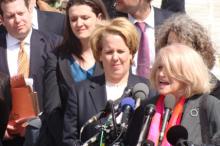
In nearly two hours of arguments on Wednesday, the Supreme Court heard many of the expected cases for and against recognizing gay marriage: that refusing to do so is blatant discrimination, that gay marriage is a social experiment that the court should not preempt, that Washington has no role in state marriage laws.
Yet it was arcane arguments over matters of legal standing that seemed to most animate the justices, reflecting what seemed to be a desire to find a way for the court to sidestep a definitive up-or-down ruling on one of the most divisive social issues.
In short, the court — particularly its conservative majority — seemed to ask why they should hear a second gay marriage case in as many days, particularly one in which the government supports the lower court’s ruling. And the answer to that question will go a long way toward determining the outcome of a spirited national debate.
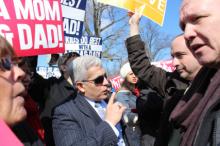
Isn’t it remarkable, attorney Ted Olson said after arguing for same-sex marriage before the Supreme Court on Tuesday, that the other side wasn’t really arguing against it?
“No one really offered a defense,” he said of his opponents’ bid to uphold Proposition 8, the 2008 California referendum that effectively ended gay marriage in the state by defining marriage as between a man and a woman.
The question inside the courtroom was not so much can there be gay marriage, but “how do you establish marriage equality?” said David Boies, another attorney for Prop 8 opponents.
Indeed, the lawyer trying to prop up Prop. 8, which was struck down by federal trial and appeals courts, spent barely any time talking about the virtues of traditional man-woman marriage or the hazards of same-sex marriage.
And that, for supporters of gay marriage, shows just how far this debate has come in the U.S.: It’s no longer “if” it will be accepted and legal, but “how” and “when.”
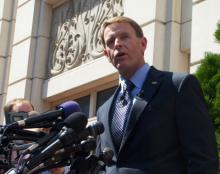
They are moms and dads, authors and activists, a former police officer and a former single mom. They’re black and white and Hispanic. One’s a Roman Catholic archbishop, another an evangelical minister. Many have large families — including gay members.
They are among the leading opponents of gay marriage, or as they prefer to be called, defenders of traditional marriage. And they’re trying to stop an increasingly popular movement as it approaches two dates with history this week at the Supreme Court.
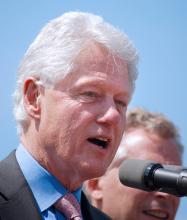
It’s not every day you see an ex-president ask the Supreme Court to strike down a law he signed.
The justices must decide whether the Defense of Marriage Act “is consistent with the principles of a nation that honors freedom, equality and justice above all, and is therefore constitutional,” Clinton writes in The Washington Post.
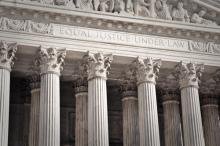
Our country’s laws represent our values and our moral compass as Americans. They set norms, define transgressions, and mete out consequences for actions. And almost 50 years ago, our nation realized the harassment, intimidation, bureaucratic shenanigans, and violence so many African-Americans and other minority communities experienced when trying to exercise their rights to vote and participate in our great democracy. Our intolerance of such injustice led to the passage of the Voting Rights Act of 1965 — a great triumph in the defense of life, dignity, and equality.
Notwithstanding the near-universal praise the Voting Rights Act has received for ending some of the most overt discriminatory practices in our country’s voting history, there are some saying the Voting Rights Act’s time has passed. In fact, on Wednesday, the Supreme Court will hear oral arguments from Shelby County, Ala., that a key provision of the Voting Rights Act is unconstitutional and should be struck down. These arguments are misguided. The Voting Rights Act remains a vital piece of our national moral commitment never to permit racial discrimination in elections again.
WASHINGTON — Foes of same-sex marriage are warning the Supreme Court that lifting state or federal restrictions would threaten their own economic and religious freedoms and lead to social and political upheaval.
In about three dozen briefs filed in recent weeks, groups ranging from U.S. Catholic bishops and evangelicals to state attorneys general and university professors argue that upholding gay marriage could lead to penalties against objecting employers, military officials, and others.
Briefs from supporters of gay marriage are due by early March.

When disgruntled congregations have left hierarchical denominations such as the Episcopal Church, they’ve often lost property battles as civil courts ruled buildings and land are not theirs to keep.
But outcomes could be different this year, court watchers say, as high-profile cases involving dozens of Episcopal congregations in South Carolina and Texas wind their way through state courts. That prospect has observers watching for insights that could shape legal strategies in other states and denominations.
Both cases involve conservative dioceses that voted to leave the Episcopal Church over homosexuality, among other issues. In South Carolina, congregations representing about 22,000 people are suing the Episcopal Church for control of real estate worth some $500 million and rights to the diocese’s identity. In Texas, the national Episcopal Church is suing about 60 breakaway congregations in the Fort Worth area for properties estimated to be worth more than $100 million.
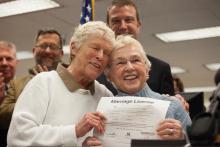
WASHINGTON — The Supreme Court's decision to take up the explosive issue of same-sex marriage will thrust the high court into a policy debate that has divided federal and state governments and courts, as well as voters in nearly 40 states.
The court's agreement to hear challenges to the federal Defense of Marriage Act and California's Proposition 8 ban on same-sex marriage moves the issue to the top of the national agenda following a year in which advocates scored major legal and political victories.
The court likely will hear the cases in March and rule by late June on a series of questions, potentially including one of the most basic: Can states ban gay marriage, or does the Constitution protect that right for all couples? It also will decide whether gay and lesbian married couples can be denied federal benefits received by opposite-sex spouses.
Any decisions will make history on an issue that has divided the nation for decades. Nine states and the District of Columbia now permit same-sex marriages, and a decision against California's Prop 8 ban would add the 10th and largest state.
A ruling against the 1996 federal law could lead to a spike in gay marriages in all those states. Several more states are likely to consider allowing same-sex marriages in 2013.
Talking Points Memo reports:
The Supreme Court declared Friday that it will take up same sex marriage next year in what’s sure to be a blockbuster case with sweeping implications.
The Court accepted a challenge to the Defense of Marriage Act, the 1996 law that prohibits federal recognition of same sex marriage. Two appeals courts have ruled that Section 3, which effectively bans same sex couples legally married in their states from receiving federal benefits, is invalid under the Constitution’s equal protection clause.
Oral arguments will be next spring and a decision is expected by the end of June
Read more here.
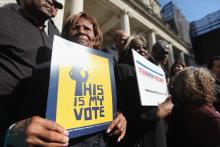
The 15th Amendment to the United States Constitution was the third in a triad of amendments crafted to protect the rights of recently emancipated African Americans. The 13th Amendment abolished slavery. The 14th Amendment granted citizenship to people who were once enslaved, regardless of race. The 15th Amendment, which was passed by Congress February 26, 1869 and ratified February 3, 1870, reads:
Section 1.
The right of citizens of the United States to vote shall not be denied or abridged by the United States or by any State on account of race, color, or previous condition of servitude —
Section 2.
The Congress shall have the power to enforce this article by appropriate legislation.
It took nearly a century of blood, terror, and tears, but in 1965 President Lyndon B Johnson and the 89th U.S. Congress passed the Voting Rights Act of 1965; legislation to enforce the 15th Amendment. Finally.
One year more than a decade later, in 1976, I walked hand-in-hand with my mother trudging up and down city blocks lined with row houses in our West Oak Lane neighborhood of Philadelphia. Each time we knocked and a neighbor came to the door, my mom, who served as the judge of elections for our neighborhood, asked: “Are you registered to vote?” If they weren’t, out came the clipboard.
I didn’t understand the legacy we were a part of that day, but with each sweep of the clipboard we were brandishing a non-violent weapon in the long fight of our ancestors to be and stay free. For 100 years — that’s five generations — they faced down the terror of burning crosses, threats to life and livelihood, and the elaborate labyrinth of Jim Crow voting laws — all set up to suppress their votes, all set up to crush their ability to exercise dominion.
So, when the Supreme Court announced recently that one of the cases it would take up in this session was a challenge to Section 5 of the Voting Rights Act, the hairs rose on the back of my neck.
ON A WINDY morning this March, as the Supreme Court began hearing oral arguments about the health-care reform law, the Affordable Care Act (ACA), hundreds of people of faith gathered in front of the court building. As part of a public witness, they prayed and carried signs that proclaimed “People of Faith for Health Care.” Participants came from various faith traditions and denominations, many of which also signed an amicus brief in support of the ACA’s expansion of Medicaid to cover more low-income adults. The event was organized by two interfaith coalitions, Faithful Reform in Health Care and the Washington Interreligious Staff Community (WISC) Health Care Working Group.
The groups involved were motivated not by political beliefs but by a moral imperative, shared across faith traditions, to build a just society that cares for the poor, the sick, the widow, the orphan, and “the least of these.”
Those who gathered believe that their prayers on behalf of the uninsured were heard when, almost three months later to the day, the Supreme Court upheld the ACA. Chief Justice John Roberts’ vote with the more liberal justices led to the unlikely majority that provided a major step forward in the century-long struggle for health-care justice in the U.S.

A federal appeals court has upheld Georgia’s ban on bringing guns into places of worship.
The Rev. Jonathan Wilkins, a Baptist pastor, and a gun-rights group had argued that church members should have the right to carry guns into worship services to protect the congregation.
But the 11th U.S. Circuit Court of Appeals ruled on July 20 that a Georgia law adopted in 2010 does not violate the Thomaston congregation’s First and Second Amendment rights.
Gun-rights advocates might want a weapon for self-defense, but that is a “personal preference, motivated by a secular purpose,” the court ruled.
Jerry Henry, executive director of GeorgiaCarry.org, said the minister and his organization are mulling an appeal to the U.S. Supreme Court.
After announcing the Evangelical Statement of Principles for Immigration Reform, Sojourners asked Christians across the country to add their endorsement. More than 10,000 people have now signed their name!

Religious groups and social conservatives are reacting to the Supreme's Court's historic ruling that largely upholds President Obama's health care law, the Affordable Care Act.
Sr. Carol Keehan, president and chief executive officer of the Catholic Health Association of the United States (CHA):
"We are pleased that, based on an initial read of the ruling, the ACA has been found constitutional and will remain in effect. CHA has long supported health reform that expands access and coverage to everyone. We signed onto amicus briefs encouraging the Court to find in favor of the ACA’s individual mandate and the Medicaid expansion. As the ruling is examined, Catholic-sponsored health care providers will continue to lead health care transformation — finding new and better ways to provide compassionate, high-quality care while strengthening the communities we serve."
The Catholic Bishops of the United States urged Congress and President Obama to repair, not replace, the health care law so that it covers immigrants, includes stronger conscience protections, and ensures that it will not fund abortions -- something the law specifically bars:
"Following enactment of ACA, the U.S. Conference of Catholic Bishops (USCCB) has not joined in efforts to repeal the law in its entirety, and we do not do so today.The decision of the Supreme Court neither diminishes the moral imperative to ensure decent health care for all, nor eliminates the need to correct the fundamental flaws described above.We therefore continue to urge Congress to pass, and the Administration to sign, legislation to fix those flaws."

In a widely anticipated and extremely consequential decision, the Supreme Court ruled today in a 5-4 decision that President Barack Obama’s chief domestic achievement, the Affordable Care Act, is constitutional.
The main challenge to the law had focused on the “individual mandate,” which required people to purchase insurance or pay a fine. In its ruling, the Court upheld the mandate under the taxing power given to Congress in the Constitution.

According to SCOTUS Blog, the Supreme Court has upheld the constitutionality of the Affordable Care Act limiting only the Medicaid provision, with Chief Justice John Roberts siding with the majority.
Read the full decision HERE.
Stay tuned to Sojourners' blog for additional comments and analysis of the decision.
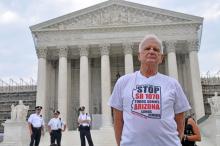
Both sides have been spinning and claiming victory in Monday’s Supreme Court ruling on Arizona’s now infamous immigration legislation SB 1070. Not surprisingly the Court ruled on the side of federal supremacy, striking down three out of four measures in the Arizona legislation, but upholding the right of local law enforcement to demand “papers” if they believe someone is undocumented.
Since the 2008 failure to move comprehensive immigration reform and last year’s disappointment on the Dream Act, the immigration reform movement has had trouble getting any “air-time” in a country that is rightfully concerned about financial recession. However, the 2012 election and a strategically placed Hispanic electorate in key swing states has candidates talking about immigration anew since the GOP primaries.
There has for some time been a larger strategy at play here that I will bluntly call “evil.”
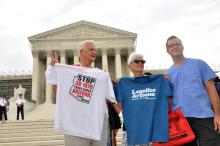
Today, as I stood on the steps of the U.S. Supreme Court eagerly following Arizona’s SB 1070 ruling, I had the opportunity to interview some advocates of the immigration reform movement.
The message that seemed to resonate among those present was that athough three of the four provisions were struck down, the fourth —the so called “show me your papers” clause — is very harmful to communities. It allows racial profiling on the basis of appearance. Even though there might be limits on how this last provision is implemented, those who feel they have the legal authority to enforce laws might feel compelled to use this piece as an excuse to discriminate.
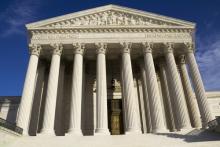
Today the Supreme Court struck down three central provisions of Arizona’s controversial anti-immigrant law, SB 1070. Attempts by Arizona to force immigrants to carry identification, create legal penalties for undocumented workers seeking employment, or detain individuals solely based on suspicions about their immigration status were ruled to interfere with the federal government’s right and responsibility to set immigration policy.
The Court let one section, known as 2(B), to stand, which allows law enforcement to check the immigration status of individuals apprehended for non-immigration offenses, if law enforcement has a “reasonable suspicion” that the person violated U.S. immigration laws in entering the country. (Read more on concerns about the racial profiling measure HERE.)